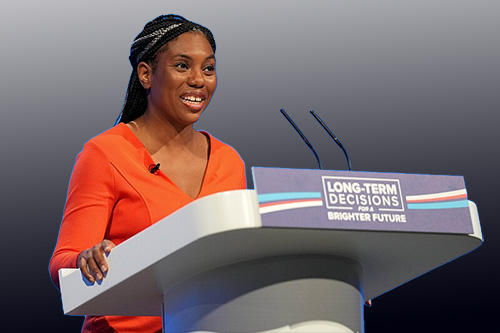Kemi badenoch Challenges Net Zero: A “Fantasy policy” under Scrutiny
Table of Contents
- 1. Kemi badenoch Challenges Net Zero: A “Fantasy policy” under Scrutiny
- 2. The Core of Badenoch’s argument
- 3. the Political Fallout
- 4. Key Excerpts from Badenoch’s Speech
- 5. Given Dr.Vance’s emphasis on societal acceptance as crucial for Net Zero’s success, what strategies can policymakers implement to effectively communicate the benefits of climate action and address public concerns about potential economic impacts?
- 6. Interview: Dr. Eleanor Vance on the feasibility of Net zero Targets
- 7. Economic Realities of Net Zero
- 8. Balancing the costs
- 9. Beyond the UK: Global Impact
- 10. Looking Ahead: A Path Forward?
British Conservative Leader Questions the economic Viability and Global Impact of Net Zero Emissions Targets.
In a move that has ignited debate across the political spectrum, Kemi Badenoch, a prominent figure in the British Conservative Party, has delivered a scathing critique of the Net zero
policy, labeling it a fantasy policy.
This bold stance comes at a pivotal moment, as global climate initiatives face increasing scrutiny regarding their economic implications and practical feasibility.
Badenoch’s comments arrive amidst shifting political landscapes, with some interpreting her statements as a response to recent polling data indicating a surge in support for parties advocating for a re-evaluation of current climate policies. This growth underscores the growing tension between ambitious environmental goals and the immediate economic concerns of citizens.
Organizations like the Global Warming Policy Foundation (GWPF) have applauded Badenoch’s skepticism,citing their long-standing warnings about the potential pitfalls of Net Zero
initiatives. The GWPF, along with other think tanks, has consistently argued that the costs associated with rapidly transitioning to a carbon-neutral economy could outweigh the environmental benefits.
Badenoch argues that the existing Net Zero
plans lack crucial details and rely heavily on unrealistic targets. Further, she expressed concern over the reliance on China for green technologies, given that China’s energy production is still heavily dependent on coal.This dependence raises questions about the true environmental impact of these policies, as well as potential geopolitical risks.
How catastrophic will be the actual costs for families, for companies and for our economy.
She points out that while the UK has made significant strides in reducing carbon emissions, its contribution to global emissions is relatively small. Badenoch suggests that the UK’s efforts alone will be inconsequential if other nations, especially major economies, do not follow suit. This sentiment echoes concerns among some U.S. policymakers who advocate for a more balanced approach to climate action, one that considers the economic competitiveness of American industries.
Badenoch highlighted three critical issues with the current approach:
- Lack of detailed plans
- Unrealistic goals
- Over-dependence on China.
This shift in rhetoric could signal a significant change in the Conservative Party’s approach to climate policy. By openly questioning the Net Zero
agenda,the party may be positioning itself to offer alternative solutions that prioritize economic stability alongside environmental protection.
The Core of Badenoch’s argument
Badenoch’s central argument revolves around the economic and practical challenges of achieving Net Zero
emissions by 2050. She contends that the current plans are built on unrealistic assumptions and fail to account for the true costs to families and businesses. Her viewpoint aligns with a growing number of economists and policy analysts who argue that a rapid transition to a carbon-neutral economy could have severe consequences for economic growth and employment.
net zero in 2050 is unfeasible.
Kemi Badenoch
She emphasizes the importance of affordable and reliable energy, arguing that policies that drive up energy costs disproportionately hurt low- and middle-income families. This concern resonates with many Americans who are already struggling with rising energy prices and inflation.
Badenoch also raises concerns about the UK’s dependence on China for renewable energy technologies. She points out that China’s dominance in the solar panel market, coupled with its reliance on coal-fired power plants, undermines the environmental benefits of these technologies. This issue is particularly relevant to the U.S., which has also become increasingly reliant on China for renewable energy components.
Here’s a breakdown of the key challenges Badenoch identifies:
| Challenge | Description | U.S. Implication |
|---|---|---|
| Lack of Detailed Plans | Current plans lack specifics, masking the true costs to families and businesses. | similar concerns exist in the U.S. regarding the economic impact of proposed climate regulations. |
| Unrealistic Goals | The 2050 Net Zero target might potentially be unattainable without significant sacrifices in living standards. | Debate in the U.S.centers on the feasibility and cost-effectiveness of achieving ambitious emission reduction targets. |
| over-Dependence on China | Reliance on China for renewable energy technologies raises geopolitical and environmental concerns. | The U.S. faces similar challenges in diversifying its supply chains for renewable energy components. |
the Political Fallout
Badenoch’s remarks have drawn criticism from political opponents, including Nigel Farage, who accuse her of hypocrisy.Farage argues that Badenoch previously supported the Conservative government’s climate policies and is now only raising concerns due to political expediency. This criticism highlights the deep divisions within the Conservative Party and the broader political landscape regarding climate policy.
Kemi does not cheat anyone. Let us with pleasure that she was happy to approve the legislation of the conservative government on this, including the recording of net zero by 2050 in the law.“ If she really believed that this would make the country bankrupt, why did she not have pronounced its resistance before? This is a desperate policy of a leader and party who struggles in the polls in an attempt to join the momentum of Reform.
Nigel Farage
The controversy surrounding badenoch’s statements underscores the challenges of forging a consensus on climate policy. While there is broad agreement on the need to address climate change, there is significant disagreement on the best way to achieve this goal. Some advocate for aggressive government intervention and rapid decarbonization, while others favor a more gradual approach that relies on technological innovation and market-based solutions. This divide is also present in the U.S.,where climate policy remains a highly partisan issue.
Key Excerpts from Badenoch’s Speech
Badenoch’s speech offers a detailed critique of the UK’s Net Zero strategy. Here are some key excerpts:
Today I am talking about one of the greatest ways in which we destroy the legacy of our children.
Kemi Badenoch
Let’s start telling the truth about energy and net zero. Everything we do in our daily life depends on cheap, abundant energy.
Kemi Badenoch
It is indeed fantasy policy. Built on nothing. The earth plundering. And it also against astronomical costs.
Kemi Badenoch
Badenoch also questioned the wisdom of previous energy policies, such as the decision to delay the construction of new nuclear power plants.
I remember that Nick Clegg has rejected the idea of building new nuclear power plants, because they would not be operational until 2022. That decision cost us billions.
Kemi Badenoch
She further elaborated on the impracticality of the government’s heat pump installation targets:
According to the Committee on Climate change, in 2040, more than half of the british households have to remove their boilers and replace it with a heat pump. We can’t do that fast enough on that time scale. In just 15 years, 17 million houses must be equipped with an expensive heat pump. How many houses have one now? Less than 300,000 – as heat pumps run on a lot of expensive electricity and it appears that many people just don’t like them.
Kemi Badenoch
The third truth. We expose ourselves to countries that do not share our values.
Kemi Badenoch
Those three truths are why I call myself a net zero-skeptic. Confusing plans, unrealistic goals and deadlines, too great dependence on China.
Kemi Badenoch
Given Dr.Vance’s emphasis on societal acceptance as crucial for Net Zero’s success, what strategies can policymakers implement to effectively communicate the benefits of climate action and address public concerns about potential economic impacts?
Interview: Dr. Eleanor Vance on the feasibility of Net zero Targets
An Expert’s Perspective on the Challenges and Opportunities of Achieving Net Zero Emissions
Archyde News: Dr. Vance, thank you for joining us today. Kemi Badenoch’s recent critique of the UK’s Net Zero targets has certainly sparked a lively debate. As a leading energy policy analyst, what are your initial thoughts on her assertions?
Dr. Vance: Thank you for having me. Badenoch raises some valid points. The challenge of achieving Net Zero by 2050 is immense, and it’s essential to approach it with a realistic assessment of the economic and practical hurdles involved. She is entirely correct to emphasize the need for detailed plans and the potential costs to families and businesses.
Economic Realities of Net Zero
Archyde News: Badenoch specifically highlights the lack of detailed plans, unrealistic goals, and over-reliance on China. Can you elaborate on these points from an economic perspective?
Dr.Vance: Certainly. Firstly, the lack of detailed plans.Many current Net Zero strategies lack the granular detail needed to estimate the true costs of this transition. As a notable example, what subsidies are needed? How will we modernize infrastructure? These plans frequently enough lack specific costings across all industries, masking the true economic burden. Regarding unrealistic goals, the 2050 timeline is extremely ambitious. Technological breakthroughs needed for widespread adoption of green energy are still years away, and scaling existing technologies is expensive. the reliance on China. The dependence on a single nation, especially for critical components like solar panels, raises both geopolitical and environmental concerns. it is indeed tough to reconcile this dependence with a commitment to reducing global emissions as China still relies heavily on coal-fired power plants.
Balancing the costs
Archyde News: badenoch notes the importance of affordable and reliable energy. How can governments balance environmental goals with the needs of low- and middle-income families, who are disproportionately affected by rising energy costs?
Dr. vance: this is the key question.it requires a multi-pronged approach: incentivizing energy efficiency improvements in homes and businesses, investing in diverse, reliable, and affordable energy sources (including renewables and potentially nuclear), and implementing targeted support programs for vulnerable households. We also need to consider market-based solutions, such as carbon pricing, but we must ensure these measures do not excessively burden consumers.
Beyond the UK: Global Impact
Archyde News: Badenoch argues that the UK’s efforts alone are inconsequential if other nations don’t follow suit. How do you assess the UK’s role in the global context of climate action?
Dr. Vance: She has a point, but the UK can still play a vital role. It can be a leader in technological innovation, policy implementation, and international diplomacy. We need to work with other nations, especially major economies, to drive down global emissions. This also includes helping developing nations with lasting energy solutions. Climate change is a global issue,and international cooperation is absolutely critical.
Looking Ahead: A Path Forward?
Archyde News: Given these challenges, what kind of approach do you think offers the best chance of success for the UK to achieve its Net Zero goals? Is it even achievable?
Dr.Vance: Whether it is indeed entirely achievable in the current timeframe is debatable, but it is still something worth striving for. A pragmatic, phased approach that prioritizes economic realities will be more effective than a purely idealistic one. This means setting realistic targets, investing heavily in research and growth, diversifying energy sources, and fostering international collaboration. It also will require ongoing monitoring and evaluation, and a willingness to adapt strategies as new technologies emerge and economic conditions evolve. Now I can say the success of Net Zero depends not just on technology, but on societal acceptance. What do you think would be the best way to ensure public support for this transition given that people frequently enough resist changes?
Archyde News: Dr. Vance, thank you for sharing your insights.






/2023/07/06/64a68815cd1a7_placeholder-36b69ec8.png)

